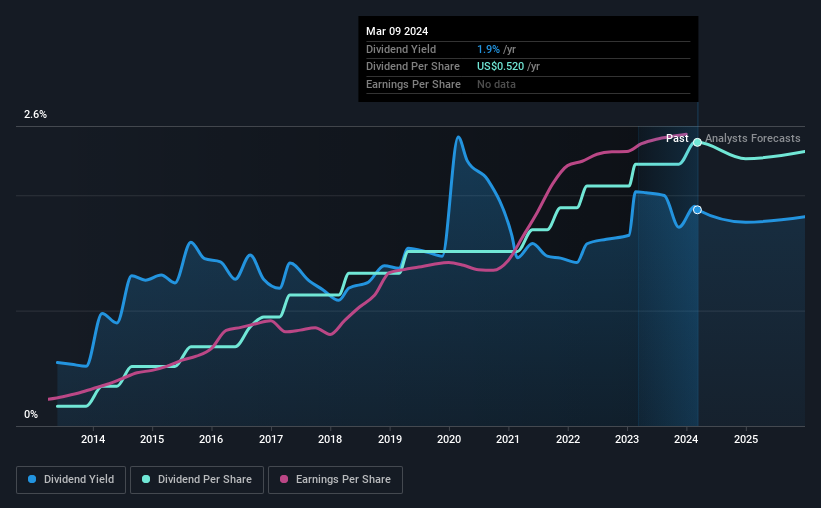Unity Bancorp, Inc. (NASDAQ:UNTY) Looks Interesting, And It's About To Pay A Dividend
Unity Bancorp, Inc. (NASDAQ:UNTY) is about to trade ex-dividend in the next four days. The ex-dividend date occurs one day before the record date which is the day on which shareholders need to be on the company's books in order to receive a dividend. It is important to be aware of the ex-dividend date because any trade on the stock needs to have been settled on or before the record date. Thus, you can purchase Unity Bancorp's shares before the 14th of March in order to receive the dividend, which the company will pay on the 29th of March.
The company's next dividend payment will be US$0.13 per share, on the back of last year when the company paid a total of US$0.48 to shareholders. Looking at the last 12 months of distributions, Unity Bancorp has a trailing yield of approximately 1.9% on its current stock price of US$27.75. If you buy this business for its dividend, you should have an idea of whether Unity Bancorp's dividend is reliable and sustainable. So we need to check whether the dividend payments are covered, and if earnings are growing.
Check out our latest analysis for Unity Bancorp
Dividends are typically paid from company earnings. If a company pays more in dividends than it earned in profit, then the dividend could be unsustainable. Unity Bancorp has a low and conservative payout ratio of just 12% of its income after tax.
When a company paid out less in dividends than it earned in profit, this generally suggests its dividend is affordable. The lower the % of its profit that it pays out, the greater the margin of safety for the dividend if the business enters a downturn.
Click here to see the company's payout ratio, plus analyst estimates of its future dividends.
Have Earnings And Dividends Been Growing?
Companies with consistently growing earnings per share generally make the best dividend stocks, as they usually find it easier to grow dividends per share. If business enters a downturn and the dividend is cut, the company could see its value fall precipitously. For this reason, we're glad to see Unity Bancorp's earnings per share have risen 14% per annum over the last five years.
Another key way to measure a company's dividend prospects is by measuring its historical rate of dividend growth. Since the start of our data, 10 years ago, Unity Bancorp has lifted its dividend by approximately 30% a year on average. Both per-share earnings and dividends have both been growing rapidly in recent times, which is great to see.
Final Takeaway
Is Unity Bancorp worth buying for its dividend? When companies are growing rapidly and retaining a majority of the profits within the business, it's usually a sign that reinvesting earnings creates more value than paying dividends to shareholders. This is one of the most attractive investment combinations under this analysis, as it can create substantial value for investors over the long run. We think this is a pretty attractive combination, and would be interested in investigating Unity Bancorp more closely.
Curious what other investors think of Unity Bancorp? See what analysts are forecasting, with this visualisation of its historical and future estimated earnings and cash flow.
Generally, we wouldn't recommend just buying the first dividend stock you see. Here's a curated list of interesting stocks that are strong dividend payers.
Have feedback on this article? Concerned about the content? Get in touch with us directly. Alternatively, email editorial-team (at) simplywallst.com.
This article by Simply Wall St is general in nature. We provide commentary based on historical data and analyst forecasts only using an unbiased methodology and our articles are not intended to be financial advice. It does not constitute a recommendation to buy or sell any stock, and does not take account of your objectives, or your financial situation. We aim to bring you long-term focused analysis driven by fundamental data. Note that our analysis may not factor in the latest price-sensitive company announcements or qualitative material. Simply Wall St has no position in any stocks mentioned.

